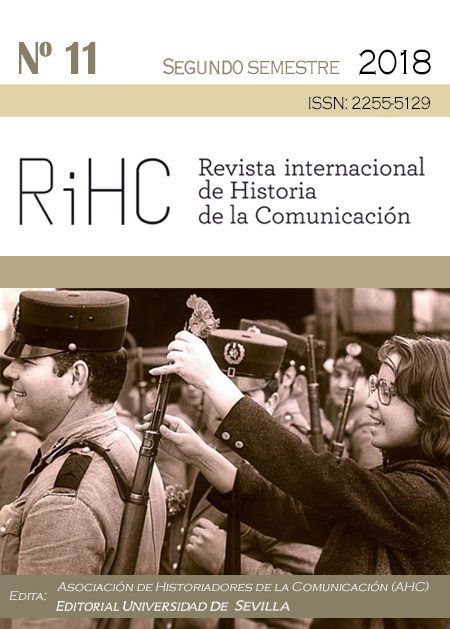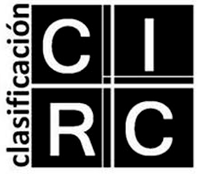Coverage of the elections of April, 1975 in the Diário de Notícias and the Jornal Novo: a case study
DOI:
https://doi.org/10.12795/RiHC.2018.i11.03Keywords:
Democratic Elections, Press Coverage, Election Campaign, Diário de Notícias, Jornal NovoAbstract
The Portuguese Revolution of April 1974 ended 48 years of dictatorship. The political evolution that followed the coup gave rise to a revolutionary process, the On-Going Revolutionary Period, which gained momentum, after March 11, 1975, opening "the path to socialism". As a side effect, the state became the owner of almost all the press. The first democratic elections took place on April 25, 1975. For the first time in almost 50 years, the press had the opportunity to do the cover in an environment of freedom of expression. However, the media were not immune to the revolutionary process and the newspapers were affected by the struggle for control of the information. The purpose of this study is a first approach in order to understand the news process and strategies to cover the electoral campaign in the press. The methodology will rely on a comparative analysis of the journalist formats in Diário de Notícas and Jornal Novo, chosen for de difference of each journalistic format and almost opposite editorial statusDownloads
References
BERMEO, N. (1986): The Revolution within the Revolution, Workers Control in Rural Portugal, Princeton, Princeton University Press
BORGES SANTOS, P. (2005): Igreja católica, estado e sociedade. 1968-1975: O caso radio renascença, Lisboa, ICS.
CABRERA, A. (2006): Marcello Caetano: poder e imprensa, Lisboa, Livros Horizonte
CAVACO, Suzana (2012): Mercado Media em Portugal no Período Marcelista. Os media no cruzamento de interesse políticos e negócios privados. Lisboa, Colibri
CORREIA, F., BAPTISTA, C. (2009): Memórias Vivas do Jornalismo, Lisboa, Editorial Caminho
DURÁN, R. M. (1997): Acciones Colectivas y Transiciones a la Democracia. España y Portugal, 1974-1977, Madrid, Instituto Juan March de Estudios e Investigaciones
FiGUEIRA, J. (2007): Os jornais como actores políticos. O Diário de Notícias, Expresso e Jornal Novo no verão quente de 1975, Coimbra, Minerva
GOMES, P. M. (2014): Os saneamentos políticos do Diário de Notícias, Lisboa, Alêtheia editores
LIMA, H. (2014): “The Portuguese press in the 3rd Republic”, in Lima, H., Hohlfeldt, A., Sousa, J.P., Barbosa, M. (editors) History of the Press in the Portuguese-Speaking, Lisboa, Media XXI, p. 325-391
MENCHER, M. (2000): News Reporting and Writing, 11th ed.,Boston, McGraw-Hill
MESQUITA, M. (1994a): “Os meios de comunicação social”, In Reis, A. (coord.) Portugal: 20 anos de democracia, Lisboa, Círculo de Leitores, pp. 360-405
MESQUITA, M. (1994b): “O Caso República. Um incidente crítico”, in Revista de História das Ideias,nº 16, pp. 507-553
NORONHA, R. (2011): A nacionalização da banca no contexto do processo revolucionário português (1974-1975), PhD dissertation, Universidade Nova de Lisboa- Faculdade de Ciências Sociais e Humanas (FCSH-NOVA)
PALACIOS, D. (2003): O Poder caiu na rua. Crise de Estado e acções colectivas na Revolução portuguesa 1974-1975, Lisboa, ICS
RAMOS PINTO, P. (2013): Lisbon Rising: Urban social movements in the Portuguese Revolution 1974-1975, Manchester, Manchester University Press
REZOLA, M. I. (2005): Os militares na revolução de Abril : O conselho da revolução e a transição para a democracia em Portugal (1974-1976), 2nd ed., Lisboa, Campo da Comunicação
REZOLA, M. I. (2007): 25 de Abril – mitos de uma revolução, Lisboa, Esfera dos Livros
RIBEIRO, N. (2002): A rádio renascença e o 25 de Abril. Lisboa, Universidade Católica.
ROSAS, F. (2004): Portugal siglo XX (1890-1976). Pensamiento y acción política, Mérida, Editora Regional de Extremadura
SÁNCHEZ CERVELLÓ, J. (1993): A Revolução Portuguesa e a sua influência na transição Espanhola (1961-1974), Lisboa, Assírio e Alvim
SANTOS, B. de S. ( 1990): O Estado e a sociedade em Portugal (1974-1988), Porto, Afrontamento
SANTOS, R. (2006): Jornalistas e Fontes de Informação. A sua relação na perspectiva da sociologia do jornalismo, Coimbra, Edições Minerva Coimbra
SCHEUFELE, D. A. (2000): “Agenda-Setting, Priming, and Framing Revisited: Another Look at Cognitive Effects of Political Communication”, in Mass Communication & Society, 3(2&3), pp. 297–316
SHOEMAKER, P., REESE, S. D. (2014): Mediating the message in the 21st century: A media sociology perspective (3rd ed.), New York, NY, Routledge
Downloads
Published
How to Cite
Issue
Section
License
RiHC. Revista internacional de Historia de la Comunicación is an open access publication, offering its content under the principle that making research available to the public free of charge contributes to the greater exchange of global knowledge.
RiHC. Revista internacional de Historia de la Comunicación adheres to the various initiatives that promote access to knowledge. All content is therefore free of charge and is published under the Creative Commons Attribution-NonCommercial-ShareAlike 4.0 International license.
By virtue of this, the authors who publish in this journal accept the following conditions:
- Open access content may be freely shared (that is, copied and redistributed in any medium or format) and adapted (remixed, transformed and built upon).
- Attribution: The user of the content must give appropriate credit, provide a link to the license, and indicate if changes were made. This may be done in any reasonable manner, but not in any way that suggests the licensor endorses the user or their use.
- Non Commercial: The content may not be used for any commercial purpose.
- Share Alike: If the content is remixed, transformed or built upon, it must be distributed under the same licence as the original.
- No additional restrictions: No legal terms or technological measures may be applied that legally restrict others from doing anything the licence permits.














